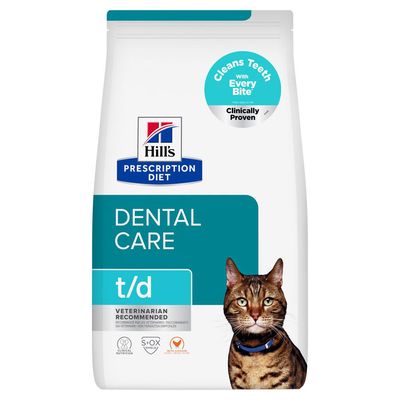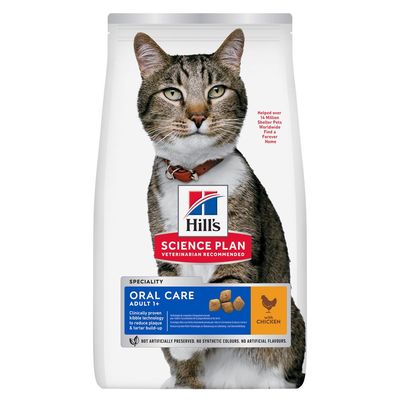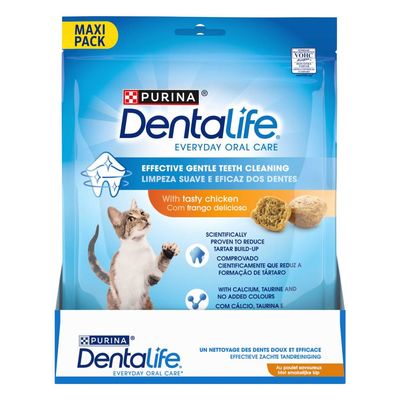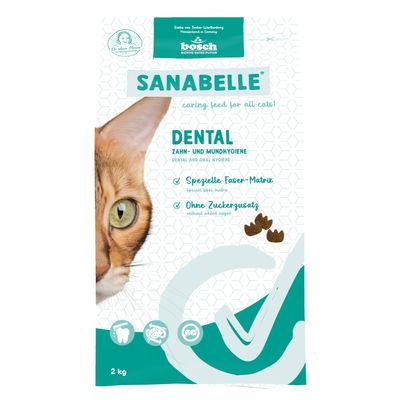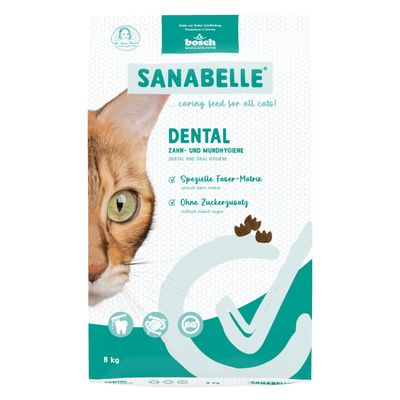Dental Cat Food
Veterinarian Dr. med. vet. Franziska G. explains: Oral care food for cats

"Plaque is formed by an accumulation of saliva, food residues and bacteria on the teeth. When minerals are deposited in the plaque, it hardens into solid tartar that can no longer be removed by chewing or brushing.
The problem, however, is that tartar irritates the gums in the long term and can lead to gum inflammation. If left untreated, a vicious circle develops in which the cat eats less and loses weight due to pain. In addition, other dental diseases (e.g. inflammation of the periodontium, periodontitis) can occur, which can act as a dangerous gateway for bacteria to enter the bloodstream."
This content is a translation of the original text published on zooplus.de, created by Veterinarian Dr. med. vet. Franziska G., in collaboration with our editorial team. The information provided is for general guidance only and is not a substitute for professional veterinary advice, diagnosis or treatment. Always consult your vet if you have any concerns about your pet’s health or wellbeing.
Veterinarian Dr. med. vet. Franziska G. explains: Oral care food for cats

"Plaque is formed by an accumulation of saliva, food residues and bacteria on the teeth. When minerals are deposited in the plaque, it hardens into solid tartar that can no longer be removed by chewing or brushing.
The problem, however, is that tartar irritates the gums in the long term and can lead to gum inflammation. If left untreated, a vicious circle develops in which the cat eats less and loses weight due to pain. In addition, other dental diseases (e.g. inflammation of the periodontium, periodontitis) can occur, which can act as a dangerous gateway for bacteria to enter the bloodstream."
This content is a translation of the original text published on zooplus.de, created by Veterinarian Dr. med. vet. Franziska G., in collaboration with our editorial team. The information provided is for general guidance only and is not a substitute for professional veterinary advice, diagnosis or treatment. Always consult your vet if you have any concerns about your pet’s health or wellbeing.
What is dental cat food?
Many cats suffer from tartar, which is caused by deposits of dental plaque and its calcification. Tartar often leads to inflammation in the mouth, for example inflammation of the gums (gingivitis). As these processes can not only be painful, but can also lead to serious health complications, it is important to ensure good oral hygiene in cats at an early stage and to have tartar professionally treated by a vet.
In addition to professional dental treatment, diet can also make a positive contribution to your cat's oral hygiene. Dental cat food specially formulated for dental concerns can help prevent plaque and thus tartar thanks to its special composition and consistency.
What is dental cat food?
Many cats suffer from tartar, which is caused by deposits of dental plaque and its calcification. Tartar often leads to inflammation in the mouth, for example inflammation of the gums (gingivitis). As these processes can not only be painful, but can also lead to serious health complications, it is important to ensure good oral hygiene in cats at an early stage and to have tartar professionally treated by a vet.
In addition to professional dental treatment, diet can also make a positive contribution to your cat's oral hygiene. Dental cat food specially formulated for dental concerns can help prevent plaque and thus tartar thanks to its special composition and consistency.
Can poor dental care be life-threatening for cats?
Poor oral hygiene can be your cat's downfall. In addition to pain and inflammation in the mouth, tartar can also lead to dangerous complications. Bacteria can enter the bloodstream via the damaged mucous membrane and reach other organs. The result? Life-threatening illnesses such as heart valve inflammation (endocarditis), liver or kidney damage. So, good dental care for cats is important and can have a positive effect on their life expectancy and quality of life.
Can poor dental care be life-threatening for cats?
Poor oral hygiene can be your cat's downfall. In addition to pain and inflammation in the mouth, tartar can also lead to dangerous complications. Bacteria can enter the bloodstream via the damaged mucous membrane and reach other organs. The result? Life-threatening illnesses such as heart valve inflammation (endocarditis), liver or kidney damage. So, good dental care for cats is important and can have a positive effect on their life expectancy and quality of life.
How does tartar develop in cats?
The development of plaque and tartar is exacerbated by various risk factors. These include:
- Wet food (e.g. due to low chewing abrasion)
- Inadequate dental care (e.g. infrequent tooth brushing)
- Sugar-rich food
- Ageing
- Genetic predisposition
- Other diseases and obesity
How does tartar develop in cats?
The development of plaque and tartar is exacerbated by various risk factors. These include:
- Wet food (e.g. due to low chewing abrasion)
- Inadequate dental care (e.g. infrequent tooth brushing)
- Sugar-rich food
- Ageing
- Genetic predisposition
- Other diseases and obesity
How can I tell if my cat has tartar?
You can recognise tartar by the typical brownish deposits that form on the teeth near the gum line. Other changes can also occur as a result of tartar:
- Bad breath and bleeding gums
- Loose teeth or even tooth loss
- Impaired ability to chew and ultimately weight loss
If bacteria penetrate the inflamed crevice between tooth and gum, abscesses can form in the jaw. In addition, the bacteria can travel to other organs (e.g. heart, kidneys) via the blood and cause dangerous inflammation there. When visiting the vet, always have your cat's teeth checked or consult a vet if you suspect that your cat has dental problems.
How can I tell if my cat has tartar?
You can recognise tartar by the typical brownish deposits that form on the teeth near the gum line. Other changes can also occur as a result of tartar:
- Bad breath and bleeding gums
- Loose teeth or even tooth loss
- Impaired ability to chew and ultimately weight loss
If bacteria penetrate the inflamed crevice between tooth and gum, abscesses can form in the jaw. In addition, the bacteria can travel to other organs (e.g. heart, kidneys) via the blood and cause dangerous inflammation there. When visiting the vet, always have your cat's teeth checked or consult a vet if you suspect that your cat has dental problems.
Which cat food is suitable for dental care?
Dental cat food can promote the dental health of cats through the following properties:
| Feature- | Mechanical abrasion |
|---|---|
Dental cat food usually has a special structure with many abrasive fibres. When your cat chews on the specially shaped pellets, this has a similar effect to brushing their teeth and can loosen plaque. | |
| Feature- | Complementary additives |
Certain ingredients (e.g. enzymes, polyphosphates) can have a positive effect on dental health. | |
| Feature- | Low in calories |
Cat food for dental care is often low in calories to prevent obesity and thus dental disease. | |
| Feature- | High acceptance |
The balanced flavour of dental cat food contributes to a high level of acceptance among many cats. |
Feature- | |
|---|---|
Mechanical abrasion | Dental cat food usually has a special structure with many abrasive fibres. When your cat chews on the specially shaped pellets, this has a similar effect to brushing their teeth and can loosen plaque. |
Complementary additives | Certain ingredients (e.g. enzymes, polyphosphates) can have a positive effect on dental health. |
Low in calories | Cat food for dental care is often low in calories to prevent obesity and thus dental disease. |
High acceptance | The balanced flavour of dental cat food contributes to a high level of acceptance among many cats. |
Ask your vet for advice on which cat food and cat treats are ideal for your cat's dental health.
Which cat food is suitable for dental care?
Dental cat food can promote the dental health of cats through the following properties:
| Feature- | Mechanical abrasion |
|---|---|
Dental cat food usually has a special structure with many abrasive fibres. When your cat chews on the specially shaped pellets, this has a similar effect to brushing their teeth and can loosen plaque. | |
| Feature- | Complementary additives |
Certain ingredients (e.g. enzymes, polyphosphates) can have a positive effect on dental health. | |
| Feature- | Low in calories |
Cat food for dental care is often low in calories to prevent obesity and thus dental disease. | |
| Feature- | High acceptance |
The balanced flavour of dental cat food contributes to a high level of acceptance among many cats. |
Feature- | |
|---|---|
Mechanical abrasion | Dental cat food usually has a special structure with many abrasive fibres. When your cat chews on the specially shaped pellets, this has a similar effect to brushing their teeth and can loosen plaque. |
Complementary additives | Certain ingredients (e.g. enzymes, polyphosphates) can have a positive effect on dental health. |
Low in calories | Cat food for dental care is often low in calories to prevent obesity and thus dental disease. |
High acceptance | The balanced flavour of dental cat food contributes to a high level of acceptance among many cats. |
Ask your vet for advice on which cat food and cat treats are ideal for your cat's dental health.
What kind of cat food is good for teeth?
Cat food specially developed for oral care, such as dental cat food, is particularly suitable for supporting dental health.
What kind of cat food is good for teeth?
Cat food specially developed for oral care, such as dental cat food, is particularly suitable for supporting dental health.
Is dry food good for cats' teeth?
The solid structure of dry food can indeed help to mechanically remove plaque and thus prevent tartar. Please note, however, that this alone is not enough to keep your cat's teeth healthy. Proper dental care for cats and regular vet check-ups are also important to ensure good dental health.
Is dry food good for cats' teeth?
The solid structure of dry food can indeed help to mechanically remove plaque and thus prevent tartar. Please note, however, that this alone is not enough to keep your cat's teeth healthy. Proper dental care for cats and regular vet check-ups are also important to ensure good dental health.
What to give cats for tartar?
Tartar does not dissolve easily and must be professionally removed by a vet. Dental plaque, on the other hand, can be removed by feeding dental cat food and special dental care snacks for cats as well as regular brushing with a special cat toothbrush and cat toothpaste.
What to give cats for tartar?
Tartar does not dissolve easily and must be professionally removed by a vet. Dental plaque, on the other hand, can be removed by feeding dental cat food and special dental care snacks for cats as well as regular brushing with a special cat toothbrush and cat toothpaste.





